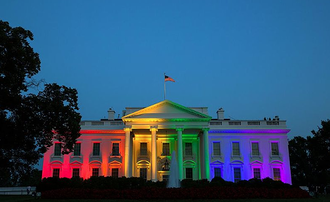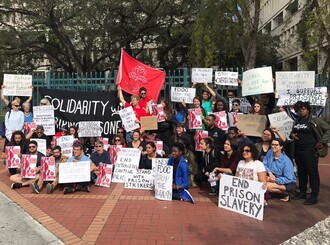- Featured
- Agriculture
- Anti-Corporate
- Antiwar
- Banking
- Budget
- Campaign Finance Reform
- Civil Liberties / Surveillance
- Civil Rights
- Economic Justice
- Education
- Elections
- Environment
- Government Accountability / Whistleblowers
- Gun Violence Prevention
- International
- Justice
- Law Enforcement
- LGBT
- Marijuana
- Media
- Nuclear
- Post Office
- Prisons
- Reform
- Retirement and Healthcare
- Taxes
- Torture
- Trade
- More
-
Pass the Equality Act to Protect LGBTQ Americans from DiscriminationWhile the groundbreaking Marriage Equality Act expanded marital protections for LGBTQ people in 2015, there is still much to be done to ensure non-discrimination protections and equal treatment under the law. Federal law and the majority of states lack explicit non-discrimination protections for LGBTQ people at work, at school, and elsewhere, leaving them vulnerable to discrimination. In other words, a person can be fired from their job, evicted from their home, denied access to housing, credit, loans, hotel services, and even jury duty on the strict basis of their sexual orientation or gender identity. The Equality Act would amend the Civil Rights Act of 1964 and other key federal non-discrimination laws to provide clear, explicit federal protection against discrimination based on sex, sexual orientation or gender identity in employment, housing, credit, federally funded programs (including education), and federal jury service. The bill would provide clear, explicit federal protections against discrimination based on sexual orientation and gender identity in the following six areas: ● Employment: The Equality Act would explicitly prohibit discrimination on the basis of sexual orientation and gender identity in employment and in the workplace. ● Federally funded programs and activities: Any program that receives federal funds would be prohibited from discriminating on the basis of sexual orientation or gender identity. This provision would protect LGBTQ people from discrimination by institutions that receive federal funds – including schools, hospitals, domestic violence shelters, and police departments. ● Housing: The Equality Act provides explicit protections for LGBTQ people against housing discrimination. ● Public Spaces and Services: LGBTQ people would be protected from discrimination in “public accommodations,” including stores, restaurants, hotels, transportation, and healthcare services. ● Banks and Credit: The Equality Act would explicitly prohibit discrimination on the basis of sexual orientation and gender identity in credit, financing, and lending. ● Federal Jury Service: The Equality Act would explicitly prohibit discrimination against LGBTQ people in selecting federal juries. All LGBTQ Americans deserve a fair chance to live, love and provide for their families without the burden of legalized discrimination. This bill will help ensure that no one is fired, evicted from their home, or denied basic services because of who they are or whom they love. Urge your members of Congress to support this critical piece of legislation. H.R. 2282, The Equality Act https://www.congress.gov/bill/115th-congress/house-bill/2282?q=%7B%22search%22%3A%5B%22Equality+Act%22%5D%7D&r=1 Human Rights Campaign: Why the Equality Act? https://www.hrc.org/resources/why-the-equality-act10,551 of 15,000 SignaturesCreated by Jamani M.
-
Undo Unconstitutional Life-Without-Parole Sentence for Bobby BosticBobby Bostic was only 16 years old when he was sentenced to 241 years in prison for non-fatal crimes. He is now 38, and will not be eligible for parole until he is 112 years old. Despite two recent U.S. Supreme Court rulings that determined life without parole sentencing for juveniles who have not been convicted of murder to be unconstitutional, the state of Missouri has repeatedly refused to offer Bobby an appeal. We must stand with Bobby in his effort to take his appeal, if necessary, to the U.S. Supreme Court. In 1995, Bobby Bostic and an older accomplice were convicted of 18 crimes stemming from an armed robbery and carjacking. While the older accomplice pleaded guilty and took a plea bargain for a 30-year sentence, Bostic took the case to trial. He was found guilty on all counts and was given the maximum possible sentence: 241 years. "Your mandatory date to go in front of a parole board will be the year 2201," the judge said. "Nobody in this room is going to be alive in the year 2201." At the time, Bobby was just 16 years old. "Two of the Supreme Court's rulings in recent years have barred judges from imposing sentences of life without parole for juveniles who haven't killed anyone," reports Riverfront Times. "But Missouri is one of a small number of states arguing that doesn't apply to defendants who aren't technically sentenced to life without parole — even if their sentences add up to just that." In addition, the Missouri Supreme Court has defended its ruling by claiming that the U.S. Supreme Court rulings pertain only to defendants convicted of a single charge, not multiple charges added together. "In practice, that means Bostic would have been better off committing a single act of murder than being convicted of multiple, non-fatal crimes," noted Doyle Murphy, a journalist at the Riverfront Times. Bostic's sentence also violates the Convention on the Rights of the Child, a treaty to which every single nation on earth other than the United States is party, and which is therefore international law. The treaty states: "Neither capital punishment nor life imprisonment without possibility of release shall be imposed for offenses committed by persons below eighteen years of age." While Bobby Bostic awaits his parole date in over 100 years from now, his accomplice will be eligible for parole next year. The case of Bobby Bostic illuminates the punitive nature of the U.S. criminal justice system. Instead of managing prisons as spaces of rehabilitation, the U.S. Department of so-called Corrections has made it a point to punish offenders in the most retributive ways possible, depriving juveniles like Bostic of any meaningful opportunity to obtain release. According to the ACLU's state legal director, Tony Rothert, "Bobby Bostic should get a chance to show that crimes he committed as a teen do not define him. The Constitution demands nothing less." Background: Riverfront Times: Bobby Bostic, Sentenced as a Teen to 241 Years, Appeals to U.S. Supreme Court https://www.riverfronttimes.com/newsblog/2017/12/21/bobby-bostic-sentenced-as-a-teen-to-241-years-appeals-to-us-supreme-court13,977 of 15,000 SignaturesCreated by Jamani M.
-
Support OperationPUSHJanuary 15 marked the beginning of a month-long work stoppage organized by prisoners throughout the Florida Department of Corrections demanding an immediate end to unpaid labor and inhumane working conditions at their facilities. The strike, announced in late December, aims to force corrections officials to pay prison laborers monetary compensation for their work as opposed to “the current slave arrangement,” in which they are paid in time deducted from their sentences. In written statements to news media, the strikers have also demanded increased access to parole, cheaper and more reasonable prices for basic food and hygiene items, voting rights for former felons, and an end to prison-guard brutality. The organized strike began on Martin Luther King Jr. Day — and is named #OperationPUSH, after civil rights leader Jesse Jackson’s 1970s-1990s campaign to improve economic conditions for African Americans. Almost a third of Florida inmates are black, compared with fewer than 17% in the general population. Florida has the nation’s third-largest prison system in the United States, with 97,000 inmates. Prison work inside Florida correctional facilities consists of doing laundry, cooking, cleaning, maintaining the facilities, and even growing food for the inmate population. Before the strike began, one organizer wrote that “[the strike’s] goal is to make the Governor realize that it will cost the state of Florida millions of dollars daily to contract outside companies to come and cook, clean, and handle the maintenance, [which] will cause a total breakdown." Outside of the prison, incarcerated laborers work in “community work squads,” providing free labor to state offices such as the Department of Transportation, the Division of Forestry, and the Department of Environmental Protection. According report by the FDOC, “community work squads” worked over 3.15 million hours in 2017 alone and saved the state more than $38 million in payroll expenses, including flooding and debris cleanup work after Hurricane Irma. Ironically, these same incarcerated workers are barred from employment at the state-level upon release, due to their criminal records. Another incarcerated organizer wrote that Florida prisoners “want to create an environment where someone can do their time, be rehabilitated, and enter into society with some type of hope…that would be helpful for society instead of creating a revolving door where you lock people up and just set them up for failure so that they keep coming back.” In fear of retaliation, these organizers have asked to remain anonymous. One week into the month-long work stoppage, internal sources have reported the participation of strikers in at least eight different Florida facilities in the FDOC. Internal sources have reported that many of these strikers have been placed into solitary confinement by correctional officials. In solidarity with prisoners, marches and protests have been organized throughout the state, and more than 135 civil rights and activist groups, including local chapters of the NAACP and the Florida Women's March, have voiced their support for #OperationPUSH. At a speech at Florida State University, civil rights leader Angela Davis said there is "no better way to keep the legacy of Dr. King alive than by supporting the prisoners' strike." Will you sign the petition to support #OperationPUSH and to demand an immediate end to unpaid labor and inhumane work conditions in Florida prisons? Sources: Movement Against Prison Slavery Ramps Up With OperationPUSH in Florida https://shadowproof.com/2018/01/11/operation-push-movement-against-prison-slavery-florida/ Florida Prisoners Set to Strike January 15th Against Prison Slavery https://itsgoingdown.org/florida-prisoners-set-strike-january-15th-prison-slavery/ Striking Florida Prisoners Thrown in Solitary Confinement, Activists Say http://www.miaminewtimes.com/news/striking-operationpush-florida-prisioners-placed-in-solitary-activists-say-100069004,790 of 5,000 SignaturesCreated by Jamani M.
-
Protect Bethesda African CemeteryThis community built the main thoroughfares in the county. It manufactured building materials and provided the manpower building the bunker under the White House. By around the 1850s free Africans owned property in Bethesda but were confined to a small area by covenants preventing them and Jews from living elsewhere. A community once thrived there. That history has been erased, but needs to be preserved. A museum could provide the archive for that history as well as serve as the vehicle for conveying the story to future generations. Washington Post death notices, County plat and plot maps, oral histories, aerial photos and other historic materials substantiate the existence and location of the cemetery. No documentation of bodies being disinterred has ever been produced. Currently there is a Sector Plan that seeks to place a parking garage and housing units on top of what is now a parking lot that was placed on top of the African Cemetery (allegedly at least in part to prevent erosion from exposing the remains). History of the enslavement of Africans is American history. More importantly, the triumph of Africans against enslavement in a living museum and memorial will be an ongoing testament to these people, their heritage and their legacy.417 of 500 SignaturesCreated by Honor O.
-
Tell Charlottesville: No Weapons at RalliesActivists, including nonviolent peace activists, are often forbidden to carry posters on sticks, having to use hollow carboard tubes, at events around the United States. Yet in Charlottesville, Va., in August 2017 a group threatening violence and having engaged in it the night before was allowed to assemble in a public space with guns, sticks, and other weaponry. The results were brutal. There is no reason that Charlottesville cannot, under existing laws, do what many other localities do and set the terms of public rallies to forbid the possession of weapons. Here’s an expert legal opinion that forbidding weapons is legal. http://www.dailyprogress.com/news/local/free-speech-expert-restricting-weapons-at-virginia-rallies-could-be/article_75548987-1529-5deb-ae11-19d2e5a7c9ac.html Here is a report on Richmond, Virginia, forbidding weapons at a rally. http://www.dailyprogress.com/news/state/richmond-police-plan-weapons-ban-at-pro-confederate-protest-saturday/article_db0447fe-c0fc-509c-912d-2b85a0959b1f.html There is nothing to be gained by trying to ban rallies of particular political viewpoints, or by trying to ban all public rallies. Either would be in stark violation of the First Amendment of the U.S. Constitution. There is no need for new laws. Charlottesville can and must commit to forbidding weapons from rallies. ********** UPDATE: Here's a list of items banned from an event in Gainesville, Florida, with hatemonger Richard Spencer. It includes all conceivable weapons, and even open flames of any kind. http://www.police.ufl.edu/wp-content/uploads/2017/10/Richard-Spencer-Speaking-Engagement-Prohibited-Items-List.pdf Here's an NBC 29 report on our petition to ban weapons from public rallies in Charlottesville. http://davidswanson.org/petition-asks-charlottesville-to-keep-weapons-out-of-rallies/ It seems to focus on this Virginia state law, which bans loaded guns from public places in a list of localities that does not include Charlottesville. https://www.lawserver.com/law/state/virginia/va-code/virginia_code_18-2-287-4 The intent in citing this seems to be to claim that Virginia state laws allowing "concealed" and "open" carrying of guns cannot be overridden in any way except in the list of localities found in that law. Yet, Richmond, which is in that list, apparently decided it could ban every type of weapon except guns. http://www.richmond.com/news/local/city-of-richmond/richmond-police-say-they-can-t-stop-unpermitted-confederate-rally/article_c25223b6-4d05-54c1-9b88-8289a0dfb90b.html Still, here is a list of weapons banned in Gainesville that nobody in Charlottesville has yet proposed, as far as I know, any justification whatsoever for not banning from the fascist rally in August or any future rally: simulated firearms, tasers, knives, sharp objects Lighters, matches, torches or open flame Any athletic equipment or other items which could be used as a weapon Masks of any kind, goggles, bandanas/scarfs, neck gaitersFlag Poles, bats, clubs, sticks (including sticks on signs) Aerosol/pressurized cans, mace Chains, padlocks, bicycle locks Shields Fireworks Backpacks, bags, purses, clutches Signs made of anything other than cloth, paper, foam core, cardboard Cans, metal or glass containers, premixed beverages or alcoholic beverages water bottles of any kind Perhaps some of the items above go overboard. Certainly the rest of the list not reproduced here does. And of course it seems crazy to ban non-gun weapons while allowing guns. But we are asking the City of Charlottesville to ban guns, knives, and sticks, and it has yet to produce any excuse for not banning knives and sticks. And the city will only be moved to pursue banning guns from public rallies if we keep up the pressure.9,981 of 10,000 SignaturesCreated by David S.
-
Giving politics back to the peopleNo corporations, non-profits, superPACS, churches, political action committees, or any other entity is allowed to donate. This government is of the people, by the people, and for the people and the PEOPLE should be the only ones allowed to donate. That way our representatives can no longer be bought and paid for my corporate America and/or wealthy individuals. Our representitives will no longer be beholden to their wealthiest donors and they will actually be beholden to the will of their constituents. One person, one vote.23 of 100 SignaturesCreated by Mathias S.
-
Stop the Dakota Access pipelineThe U.S. Army Corps of Engineers had failed to conduct a proper environmental and cultural impact study. ... The Standing Rock Sioux tribe believes that the pipeline would put the Missouri River, the water source for the reservation, and the local environment at risk.9 of 100 SignaturesCreated by Nicole M.

-
A new emoji peace symbol for World Peace is neededTo promote the need for respect, safety and dignity for all everywhere on earth.4 of 100 SignaturesCreated by Robert H.

-
Close the Disgraceful California Rehabilitation Center in Riverside CountySign this petition to ask California Governor Jerry Brown to shut down California Rehabilitation Center at Norco in Riverside County. A recent report from the California State Department of Public Health revealed shocking conditions at CRC-Norco, a medium-security state prison. This prison houses an astonishing 3,400 prisoners in unsafe and unsanitary conditions that include broken floor tiles, rat and cockroach infestations, and standing pools of water. With a population capacity of 2,491 people, the facility is both overcrowded and structurally neglected. "CRC-Norco is dilapidated and unsafe…. We have known for years that this prison is in terrible shape," said California State Senator Loni Hancock. In 2012, the California Department of Corrections and Rehabilitation publicly acknowledged the unsafe conditions at CRC-Norco and set forth a plan to close the facility by June 2016. One year later, however, prison administrators suspended the deadline, stating that a federal court order to ease crowding in California’s already overcrowded prisons mandated the CDCR to keep the facility open until further notice. That decision was reaffirmed in January 2016 when Governor Brown released the CDCR budget proposal for the 2016-17 cycle, which reflected an extended continuation of operations at CRC-Norco. It is unconscionable for Governor Brown and prison officials at the CDCR to continue to house incarcerated people at a facility that is publicly known to be infested with vermin and structurally unsafe. Keeping the prison open and operating creates a host of health and safety hazards for both the inmates and employees. In addition, it reflects an extraordinary disregard for the human rights of the 3,400 people who are forced to live at the overcrowded, decaying facility. CRC-Norco should be shut down immediately.6,716 of 7,000 SignaturesCreated by Jamani M.
-
Impeach Trump and Republican agendaTrump will not release his tax returns. Trump refuses to divest himself of his vast business interests. That creates obvious conflicts of interest, especially when it come to overseas matters. That is forbidden under Article I, Section 9 of the Constitution and is grounds for impeachment. Trump should not be allowed to enrich himself and his family through sweetheart deals. Need I say more?23 of 100 SignaturesCreated by shawn b.
-
Natural Resource POWER PLANTIn order for humanity to thrive we have to be willing to change our destructive economy. Working with nature is the answer. Helping people while growing business should be the bottom line of any business. Allowing society to embrace healthy ways of living while living in luxury is possible. Power Plant has many great ideas of changing our world for the better. From paper to fuel to plastic, we can still go about our daily lives and have all the necessities its just time to support new resources and companies willing to do so.20 of 100 SignaturesCreated by brittney y.

-
California Prisoners Bear the Brunt of Statewide Water ShortageIn the wake of the state’s most severe drought in memory, California Governor Jerry Brown issued mandatory statewide water restrictions that require all public agencies to reduce their water consumption by 25 percent. Officials at the 34 prisons operated by the California Department of Corrections have responded by restricting inmates' showers, ability to flush their cells' toilets, and access to laundry services and clean clothes, according to interviews with inmates. Showers are running only three days a week (Tuesday, Thursday, Saturday) for a total of four hours, providing a little over an hour for hundreds of prisoners to take turns bathing on shower days. Any prisoner caught in the showers for more than 5 minutes, washing clothes while showers are running, bird bathing or flushing the toilets in their assigned cell could face disciplinary action, including 30 days added to their prison sentence (CDC-115 Rules Violation Report). Prison officials have been instructed to shut off water fountains, outdoor showers, and to stop hosing down sidewalks. As a result, California prisoners are denied water-breaks throughout the day and are refused the hygienic practice of washing off sweat after a workout. Women's prisons in particular have struggled with sanitary upkeep since the implementation of CDCR’s water conservation program. Shower and toilet restrictions affect female prisoners on their menstrual cycles most directly. CDCR’s water conservation program began in 2006 with a pilot project to install flush-restricting valves on toilets at nearly one-third of all California adult institutions, resulting in a host of unsanitary conditions ranging from foul odor to overflowing toilets. Water conservation methods have only grown more aggressive within the recent decade and California prisoners have borne the brunt of health and safety hazards associated with aggressive yet inadequate conservation planning. If California is serious about water conservation and water-use reduction in its prisons, state officials should consider developing policies that promote the depopulation of overcrowded state facilities -- starting with releasing disabled people, the elderly and non-violent offenders. Reducing the numbers of people incarcerated unnecessarily could result in significant water savings and help to make the prison environment more adaptable and suitable for rehabilitation. Other methods of reducing water waste, without violating the human rights of the imprisoned, can include updating sinks, toilets, showers, and appliances with advanced water-saving fixtures. Sign this petition to California Governor Jerry Brown asking him to immediately end all water conservation methods that violate the human rights of people in prison. Sources: http://www.latimes.com/local/political/la-me-ff-to-save-water-california-turns-off-prison-showers-20150709-story.html https://www.vice.com/en_us/article/california-prisons-are-restricting-shower-and-toilet-use-to-fight-the-historic-drought-626 http://www.insidecdcr.ca.gov/2010/04/california-prisons-reduce-water-consumption/ http://www.inmate.com/prison-articles/california-prisoners-affected-by-drought.htm5,287 of 6,000 SignaturesCreated by Jamani M.



.jpg)



.jpg)




